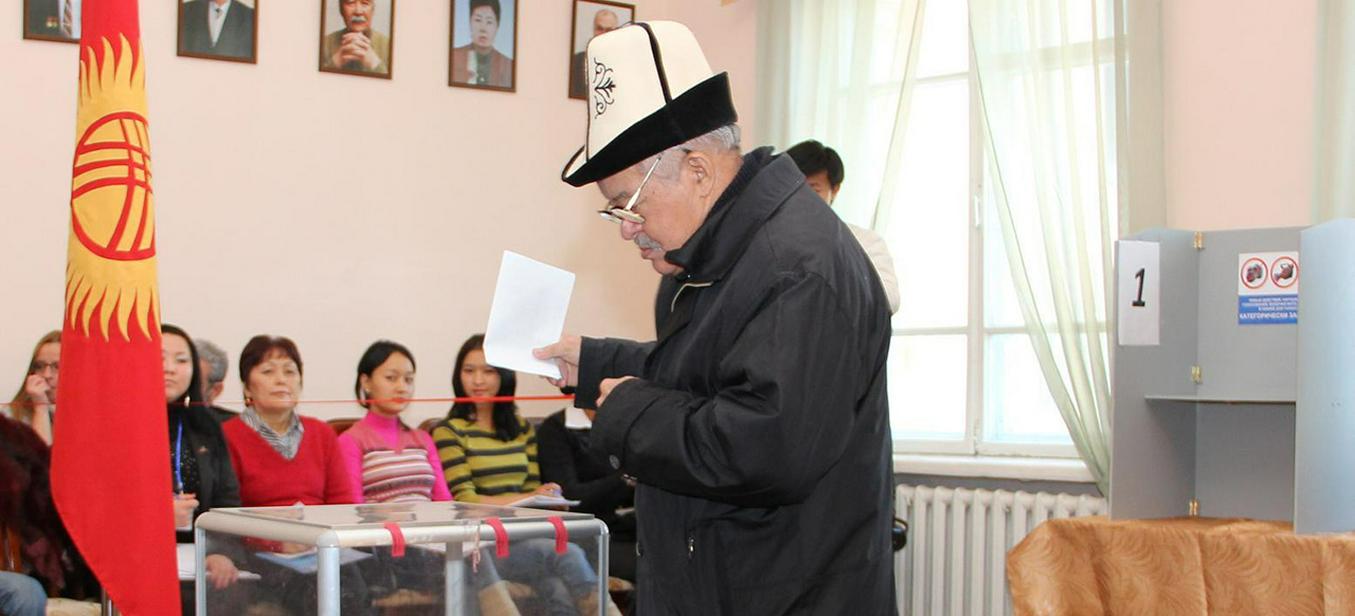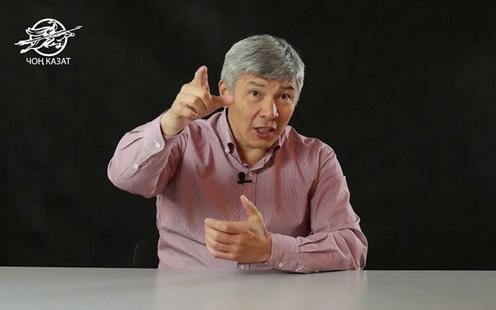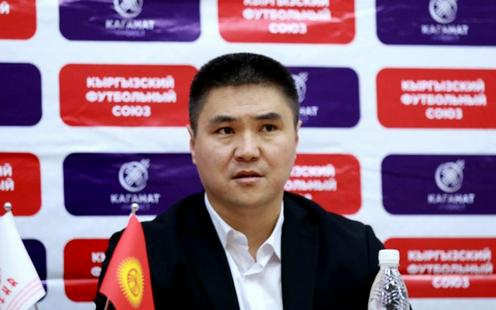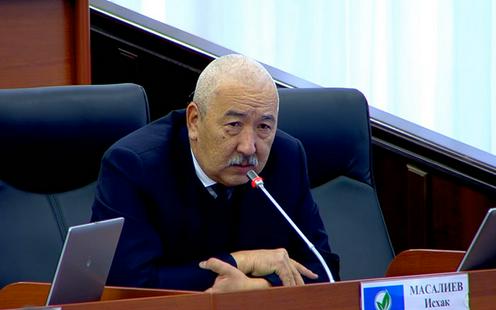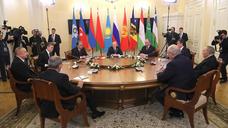In less than four months’ time Kyrgyzstan will hold parliamentary elections which will finally allow the country to take stock of the painful transition of presidential power that formally took place in 2017 but which in practice has dragged on over the following three years. At present it is difficult even to begin to predict which parties will enter into a new ruling coalition. The former party of power has split into opposing factions and continues its decline, and a serious alternative to it is yet to emerge. The possible scenarios, however, are many – in recent weeks political life in Kyrgyzstan, interrupted by the COVID-19 pandemic, has been noticeably reinvigorated.
Political mushrooms
Immediately after independence, a plethora of political parties were founded in Kyrgyzstan. “Anyone who wanted to do so set one up. Parties appeared like mushrooms after the rain,” political commentator Vyacheslav Timirbaev recalled in 2019. One of them, the Social Democratic Party of Kyrgyzstan (SDPK), was founded in 1993 by the head of the research and production company Forum, Almazbek Atambaev, along with general director of the Kormmash technological engineering institute Anatoly Maryshev, Bishkek municipal administration head Jumabek Ibraimov, Jalal-Abad regional administration head Abdyjapar Tagaev, Osh regional administration head Abdygany Erkebaev, and the head of the government office’s department for youth policy, Akylbek Japarov. Over the following years all of these individuals, with the exception of Atambaev, subsequently left the party, which allowed the future president to present himself as the party’s sole remaining founder.
The SDPK took an active part in the revolution of 2005, when the country’s first president Askar Akaev was overthrown. In 2006, Jogorku Kengesh (parliament) speaker Omurbek Tekebaev, who had been attempting to counteract the growing power of new head of state Kurmanbek Bakiev, was forced to resign. A constitutional reform was carried out, according to which parliament was to be elected by party list. In the 2007 elections the majority of seats were won by representatives of the Ak Jol party set up by Bakiev. The SDPK won 11 seats. It gained the reputation of “the most oppositional parliamentary party” and its deputies became known for their eccentric stunts – for instance, when the deputy speaker of parliament asked Irina Karamushkina to moderate her tone, the latter responded by taping her mouth shut.
After the 2010 revolution, one of the SDPK’s deputies, Roza Otunbaeva, served as the transitional government’s acting head of state. And in 2011 Almazbek Atambaev himself was elected president and formally resigned from his post as party leader. It was nevertheless obvious that the “most oppositional” SDPK had turned into the party of power.
At the same time, a new constitution was adopted that transformed Kyrgyzstan from a presidential into a parliamentary republic. From one point of view, this was a logical decision. A couple of years prior to the fall of the Soviet Union, the Supreme Council of the Kyrgyz Soviet Socialist Republic acquired such extensive powers that it is still known as “the legendary parliament”. All subsequent embodiments of the Jogorku Kengesh over the following years have also shown a far greater independence from the executive than parliaments in other post-Soviet countries. On the other hand, critics argued that political parties in Kyrgyzstan were not sufficiently well developed to govern the country through coalitions, without reliance on a strong leader.
Harder than revolution
In late 2017 Atambaev entered history as the first elected president of Kyrgyzstan to leave his post when his term expired without the helping hand of a revolution. His successor following the presidential elections was Sooronbay Jeenbekov, who had been a member of the SDPK since 1995. Atambaev himself returned to the position of chairman of the SDPK. It seemed as if a successful transition of power had been accomplished within one and the same party without any particular political convulsions. But such hopes were dashed by a personal conflict between Atambaev and Jeenbekov which, according to sources, began almost immediately after the latter’s inauguration. By the start of 2018, the dispute between the former and current presidents was already being discussed in the corridors of power, and by 2019 Atambaev had come out in open and bitter opposition.
Some SDPK members did not wish to follow their leader into opposition. Initially they simply continued to conduct meetings among themselves, calling themselves the “SDPK without Atambaev”, but in April 2019 they managed to reregister the party, designating as leader the little-known party member Sagynbek Abdrakhmanov. Malicious tongues said that the dissidents’ only goal was to weaken the party by placing its legal existence into question. This may very well have been the case: since its registration “Abdrakhmanov’s SDPK” has shown very little sign of life. Or perhaps the dissidents have simply been unable to grapple with the task of organising effective political action. One way or another, as before, only “Atambaev’s SDPK” (now formally illegal) has remained visible in the political arena.
In May of the same year, Atambaev left his post as leader of the SDPK. Commentators suggested that this was an attempt on his part to avoid the revocation of his legal immunity. According to Kyrgyz legislation, a former president’s immunity cannot be revoked unless he is involved in politics. But stepping down from the leadership did not help – in June Atambaev’s immunity was revoked. From that point onwards he remained almost without exception at his residential compound in the village of Koy-Tash. Only on one occasion did he take a charter flight to Russia to meet with Russian president Vladimir Putin. The latter politely made it clear that he was not prepared to intervene in the conflict between the two Kyrgyz presidents.
In August, special forces stormed Atambaev’s residential compound. By the second day of the siege, the ex-president was behind bars. A series of corruption charges were filed against him, along with charges relating to the altercations at Koy-Tash. The ex-president’s supporters are accused of the murder of a special forces soldier who was the sole casualty of the raid. Atambaev’s trial began in the autumn of 2019, but progress has been slow due to the former head of state’s consistent refusal to leave his cell to attend court.
A muddle of a parliament
The SDPK fraction in the Jogorku Kengesh neither took the side of “Atambaev’s SDPK”, nor that of “Abdrakhmanov’s SDPK”, but rather continued to act in practice as an independent entity. The fraction is part of the Kyrgyz parliament’s coalition majority, which in formal terms is the highest authority in the parliamentary republic. Other members of the coalition include the parties Kyrgyzstan, Bir Bol (Unite, literally “Be One”), and Respublica-Ata-Jurt (a union of the “Republic” and “Fatherland” parties). The parliamentary opposition is composed of the Ata-Meken (another word for fatherland) and Onuguu-Progress parties.
So far the Kyrgyz parliament, elected under Atambaev back in 2015, continues to function by inertia, but it is becoming more and more obvious that the divided and weakened SDPK can no longer stake a claim to leadership. The part of it controlled by Atambaev’s followers is fully focused on the fight with Jeenbekov over the fate of a single political prisoner. The group’s claims may be to some extent justified, but the fate of the country is clearly not their top priority at present. And Abdrakhmanov’s SDPK, as mentioned above, has not engaged in any serious political activity.
Another split has occurred in the union between the parties Respublica and Ata-Jurt. In October 2019 it emerged that the union, established in 2014, had in practice ceased to exist back in 2016. But it was not until three years later that Ata-Jurt leader Kamchybek Tashiev revealed in an interview that it had been a long time since he had met with Respublika leader Omurbek Babanov and that he intended to contest the 2020 elections as a separate party. As for Babanov, he was forced to flee to Russia in 2017 after running in that year’s presidential elections. He returned only in August 2019 and is now serving as a witness in several criminal cases.
In 2017, Ata-Meken party leader Omurbek Tekebaev (the same man who, as speaker of parliament, had clashed with Bakiev in 2006) was sentenced to eight years in jail on corruption charges. In August 2019 the Supreme Court of Kyrgyzstan sent his case for review and Tekebaev himself was released into house arrest. After this, a series of conflicts began to erupt within the party and one after the other a number of major political names started to leave the party. “In my opinion, an important role in party members’ exodus was played by Tekebaev’s personal ambitions for political revenge,” stated political analyst Mederbek Korganbaev.
Nothing catastrophic seems to have befallen the other parliamentary parties – Kygyzstan, Bir Bol, and Onuguu-Progress over the past few years. But these parties have never ranked among the country’s most influential.
(Editor’s note: After this article was originally published, Ata-Meken leader Omurbek Tekebaev announced the formation of a new alliance, to be called Jany Dem (New Breath), between the Ata-Meken party, the Ak Shumkar party, the Kyrgyz Liberal Democrat Party, former SDPK member Ryskeldi Mombekov, the youth organisation Jany Dem, and the Green Alliance of Kyrgyzstan (an alliance of 60 environmental groups).)
The SDPK’s heirs
As soon as the first signs of a split in the SDPK appeared, commentators began to predict that President Sooronbay Jeenbekov was about to form a new party of power or show a clear sympathy for one of the existing parties. This appeared logical in post-Soviet countries, where heads of state are necessarily associated with the “foremost” party (which inherits the image of the Communist Party). But there are less than four months remaining to the Jogorku Kengesh elections, and Jeenbekov has still not turned his attention to party formation.
Perhaps the president understands that the reputation of any new party specially created by the executive would initially be considered compromised. At the founding congress of the Ak Jol party in 2007, Bakiev felt it necessary to justify himself: “We are not a party of power nor a party of top officials. We are a party of workers. We are a party of men of action.” But this was not enough to save him from revolution. For the same reason Jeenbekov is unable to start demonstrating his favour for any of the existing parties. Doing so is not likely to strengthen its position, rather the opposite.
Perhaps a little more beneficial for a new party are links with Atambaev, who is now no longer the face of the authorities but rather a political prisoner. Atambaev’s sons Seid and Kadyrbek are currently working to portray themselves in the role of his successors. Seid, Atambaev’s son from his first marriage, has been a formal member of the SDPK since 2004, but, according to him, has participated in the life of the party from the moment of its foundation. Until 2019 Atambaev’s son from his second marriage, Kadyrbek, was not active in political life, but once his father started to be hounded by the authorities he too joined the SDPK.
On 21 May 2020, a member of “Atambaev’s SDPK”, Adil Turdukulov, drew attention to the fact that Seid and Kadyrbek are more and more often making pronouncements in the name of the party without discussing the matter with fellow party members first. Acting SDPK chairwoman Asel Koduranova promised that the issue would soon be brought up for discussion at a meeting of the party’s political council. At the same time, the Atambaev brothers were defended by parliamentary deputy Irina Karamushkina, who said that Turdukulov was a schemer who no one in the SDPK took seriously. Karamushkina expressed disappointment at the fact that Turdukulov had received the support of Koduranova and of the SDPK's official spokeswoman Kunduz Joldubaeva.
But the most important part of Karamushkina’s statement was the announced that the brothers had already registered a new party by the name of “Social Democrats of Kyrgyzstan”. Active promotion of the party had not yet gotten underway, she said, but it would be under this new party’s banner that the Atambaevs planned to run in the 2020 elections. On 26 May Turdukulov stated that his group had passed on a letter to Atambaev through lawyers and asked him to make a pronouncement on the situation, but that the ex-president had chosen to remain silent.
At the same time, reports appeared in the media that SDPK deputies in parliament had begun to join the Birimdik (Unity) party, formed in Osh in 2005 but not especially active in recent years. The new leader of this political organisation, which possesses a confusing and convoluted history, was named as SDPK-fraction parliamentary deputy Marat Amankulov. Amankulov himself commented on his new appointment only with the vague statement that: “I was asked to take over the party and I agreed”.
It seems likely that, ultimately, the Social Democrats of Kyrgyzstan will become the heirs to “Atambaev’s SDPK” – in other words the oppositional SDPK – and Birimdik will attempt to replace the SDPK as the party of power. At least it seems pretty safe to say that such are the plans of the politicians involved. In the complicated political life of Kyrgyzstan, however, things far from always work out as planned.
(Editor’s note: After this article was originally published, at the SDPK political council meeting referred to above almost the entire leadership of “Atambaev’s SDPK” has either left their leading roles or entirely left the party. Asel Koduranova has stepped down as acting chairwoman, and Ryskeldy Mombekov and Kunduz Joldubaeva have left their roles as deputy chairpersons and their positions on the political council. All three, however, initially remained in the party, though Mombekov has since joined the new movement Jany Dem (see note above). Irina Karamushkina has not only left her position as deputy chairwoman and her role on the political council but also left the party entirely, as have political council members Meerbek Miskenbaev, Adil Turdukulov, Mirbek Aitikeev and Kunduz Ajybekova. Anvar Artykov has taken over as temporary chairman. Soon afterward, Almazbek Atambaev issued a letter from prison calling on the party to put their conflicts behind them and unite around Artykov.)
Shining newcomer
Meanwhile, new parties without any links to the events of recent years are hoping to profit from the current political indeterminacy. In a sense their hopes are not misplaced – for members of the public who have grown weary of precisely these kind of events, the idea of turning a new page may seem enticing.
This is very clearly the card being played by the movement Chong Kazat (Great Crusade), which emerged onto the political scene (albeit essentially online) in the spring of 2020 with the demand to “steal what has been stolen” (“грабить награбленное”) – in other words carry out investigations into the sources of politicians’ wealth. The emblematic victim of this campaign so far has been Bir Bol party deputy Kubanychbek Jumaliev: Chong Kazat members have succeeded in getting the country’s law enforcement agencies to launch an investigation into his wealth. In response, a number of other deputies declared that Chong Kazat was promoting insurrection and the unlawful expropriation of property. The Kyrgyz interior ministry replied that it would also conduct investigations into the legality of the movement’s slogans.
Members of Chong Kazat have emphasised that that they are opposed in principle to the idea of uniting with parliamentary parties or former officials and deputies during the election campaign. The major part of the movement’s membership, according to the leadership, is formed of “progressive, educated guys and girls between the ages of 28 and 35”. In other words, the group’s appeal relies directly on the principle of “youth and novelty”. But not only on this.
In the first place, the fight against corruption and illicit wealth was one of the main topics on the agenda in Kyrgyzstan throughout 2019. Over the course of the year, a series of journalistic investigations were published into the activities of the powerful Matraimov family, none of whose members have ever occupied the highest offices of state, but which, through every change of power, has always managed to stay afloat and carry on accumulating wealth. The journalists’ main informant, shady banker Aierken Saimaiti, was shot dead in Turkey in the autumn of 2019. According to the official investigation, the murder was not linked to Kyrgyzstan – it was suggested that Saimaiti had been killed by former associates of his in a little-known Syrian religious group. The banker’s death nevertheless served to heighten public interest in the journalistic investigations into the Matraimovs’ activities. Kyrgyz law enforcement agencies are currently pursuing inquiries in relation to the material published by journalists, but to date not a single member of the Matraimov family has faced any real difficulties from the investigation.
Secondly, the COVID-19 epidemic which struck Kyrgyzstan in March and the extensive lockdown measures which have accompanied it have dealt a severe blow to the country’s economy. Many Kyrgyz have lost their livelihoods and become particularly responsive to talk of any kind of excessive wealth. And members of Chong Kazat are not only vocally castigating the “plunderers of the people” but also actively distributing aid to those who have suffered the most from the current crisis.
The well-forgotten past
In reality, it would be wrong to call Chong Kazat a totally new organisation. The movement’s founder is not a “progressive, educated guy between the ages of 28 and 35” but rather the former head of the State Committee for National Security’s department for fighting corruption and economic crimes committed in public office, Maksat Mamytkanov. He is first mentioned in the press in 2003 in connection with his role in the SCNS. He then disappears from media view, but in 2011 he started to provide occasional commentary to news outlets as an “expert”, “independent expert”, “political analyst”, and “expert on security issues”. In 2016 Mamytkanov appeared as a secondary figure in an article in the newspaper Bagyt. There he was characterised as a schemer and it was asserted that he “was chased out of the SCNS for shortcomings in his performance”.
According to the same article, one of Mamytkanov’s friends at that time was Turat Akimov, who in 2011 was the chief editor of a newspaper by the name of...yes, Chong Kazat. In 2017, Akimov ran for president under the banner of Chong Kazat, which by that point had transformed itself from a newspaper into one of many little-known parties (by various accounts there are between 200 and 250 of them in Kyrgyzstan). In the summer of 2019, Akimov, along with what was now referred to as the “Chong Kazat group”, demanded the resignation of prime minister Mukhammedkaliy Abylgaziev.
Then in January 2020, Mamytkanov and former employee of the state prosecutor’s office Siymyk Japykeev decided to found what was now referred to as the “movement” Chong Kazat. One of the movement’s members, former member of the Council for the Selection of Judges Kanat Khasanov, later told KaktusMedia: “Maksat Mamytkanov and I met on many occasions at round table events and chatted. Together we came to the conclusion that the state is on the brink of ruin and that it is necessary to form a new elite which will carry out a revolution in the minds of the public without holding mass meetings. On the basis of this idea, Siymyk Japykeev gathered us together on 27 January, at which point the Chong Kazat party already existed, but we promoted ourselves not as a party but as a social movement under the Chong Kazat brand.”
According to Khasanov, the movement initially planned to move forward by organising round tables and further discussing ways of reforming and developing the state. These plans were interrupted by the COVID-19 epidemic. However, as mentioned above, rather than dealing the organisation a blow mid take-off, it seems far more likely that the epidemic has helped it. Khasanov stated that the movement has now decided to re-register itself, to revive the political party and compete in the parliamentary elections.
The “Freemasons”
Talking to Russian newspaper Novaya Gazeta, expert commentator Asilbek Egemberdiev suggested that not only the above-mentioned Birimdik would stake a claim to be the Kyrgyz parliament’s pro-government party but also the party Mekenim Kyrgyzstan (My Homeland Kyrgyzstan). According to Egemberdiev, there are rumours going around that this party has no problems with money, and in politics secure financing means a great deal. Even more significantly, some sources claim that Mekenim has links to the infamous Matraimovs. But then again, in Kyrgyzstan these days everyone accuses their opponents of having ties to the Matraimovs.
The party was founded in 2015 and gained seats on many local kengeshes (councils) in the 2016 and 2018 elections, before being re-registered in May 2019. Officially, the man who inspired the formation of Mekenim was entrepreneur Nurbek Osmonov and its core is formed of “many successful businessmen”. Independent sources state that almost all of these businessmen are engaged in the construction industry. For this reason the party is even frequently compared to the Freemasons.
In 2018, journalists named Nurbek Osmonov as one of the possible founders of the construction company Ikhlas (which at the time was accused of a number of illegal schemes and practices). However, the authors of the report were forced to note that: “About Osmonov’s involvement in the party Mekenim Kyrgyzstan it has not been possible to find any information.” In the two years since then the situation has clearly changed to such an extent that Osmonov’s name appears on the party’s official site.
The journalists established that several of Mekenim’s members are also involved in the tourism and advertising branches, and maintain links with businessmen from Saudi Arabia. In connection with the latter point, it is noted that, according to unconfirmed reports, within the infamous Ikhlas firm the observance of Islamic norms is strongly encouraged.
In other words very little is known about this political party, though it is surrounded by a number of strange rumours. Party members do not seem to be in any hurry to dispel these rumours by giving any detailed account of what they stand for. On the group’s official website it is stated: “The Mekenim Kyrgyzstan Party adheres to the principle that actions speak louder than words. The active members of our political organisation have achieved real results in business, and instead of transferring their capital outside of the country they are investing it in the development of Kyrgyzstan.”
Lowering the threshold
Thus none of the parties mentioned above looks to be a clear-cut favourite to win the upcoming election campaign. Meanwhile, in 2017 the threshold to enter the Jogorku Kengesh was raised from seven to nine percent. In other words, if less than nine percent of voters vote for a particular party then this party will not acquire a single seat in parliament. Yet in the current circumstances it appears doubtful that many parties will overcome such a threshold. For this reason, in the autumn of 2019 Jogorku Kengesh deputies put forward a draft law to lower the threshold back down to seven percent, with some deputies arguing that it should be reduced even further – down to five percent.
“With a nine percent threshold the elections might be declared invalid. A single-party parliament could be formed, and in this case it would be illegitimate since the constitution states that no political organisation can obtain 60 mandates. If two parties make it into parliament then a third one will be given nominal representation,” explained former Jogorku Kengesh speaker Ishenbay Kadyrbekov. In Kadyrbekov’s opinion the optimal solution was a seven percent threshold rather than five.
The draft law on a seven-percent threshold successfully made it through its first reading. On 19 May the Jogorku Kengesh’s committee on constitutional law, legal matters and regulations rejected the idea of lowering the threshold to five percent. Following this, Onuguu-Progress deputy Iskhak Masaliev renounced his seat in parliament, accompanying his decision with an emotional speech. “The committee recently discussed the draft law [on a five percent threshold] and rejected it,” Masaliev said. “Deputies vote according to their own interests and the interests of their parties, but in my 15 years of working as a deputy this is the first time I have seen a draft law being unfairly rejected.” He also reminded speaker of parliament Dastan Jumabekov of the latter’s recent ambiguous declaration that deputies who do not like how things are done in parliament should simply leave.
Masaliev stated: “I am ready to help the state in other places, but I feel that my continued service as a deputy is impossible.” Later, however, he added that he may still compete in the October elections.
Thus what has happened in Kyrgyzstan is precisely what the country was warned about the moment the country opted to switch to a parliamentary form of rule. Parties truly capable of effectively guiding the life of the country have not appeared. The majority of deputies, although active, are not behaving like managers of the public sphere but simply articulating limited demands and complaints. At the same time, Jeenbekov appears to have learnt a lesson from Atambaev’s mistakes and is not trying to go around the constitution by claiming the role of national leader – in other words the mediator of these demands and complaints. He may be suspected of involvement in hidden intrigues and of having links with this or that party, but he himself is instead cultivating the image of a humble public servant in a high, but not the highest, position. We will have to wait for the autumn to find out what the composition of the new parliament will be and what political life in Kyrgyzstan will look like moving forward.
Tatyana Zverintseva
Translated and updated by Nick L.
-
 23 December23.12PhotoTokyo DriveJapan to invest about $20 billion in projects across Central Asia over five years
23 December23.12PhotoTokyo DriveJapan to invest about $20 billion in projects across Central Asia over five years -
 17 December17.12Sake for SixCentral Asia’s Rapprochement with Japan Comes with Hidden Pitfalls
17 December17.12Sake for SixCentral Asia’s Rapprochement with Japan Comes with Hidden Pitfalls -
 17 September17.09Risky PartnershipWhy Dealing with China Is Harder Than It Seems at First Glance
17 September17.09Risky PartnershipWhy Dealing with China Is Harder Than It Seems at First Glance -
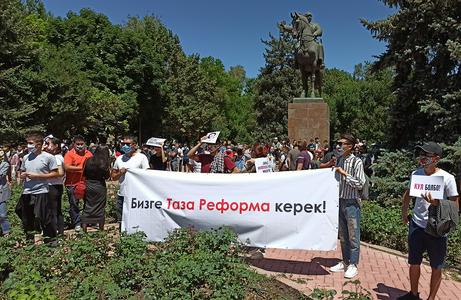 30 June30.06PhotoReAction against censorshipDemonstrators in Bishkek protest against the draft law “On the manipulation of information”
30 June30.06PhotoReAction against censorshipDemonstrators in Bishkek protest against the draft law “On the manipulation of information” -
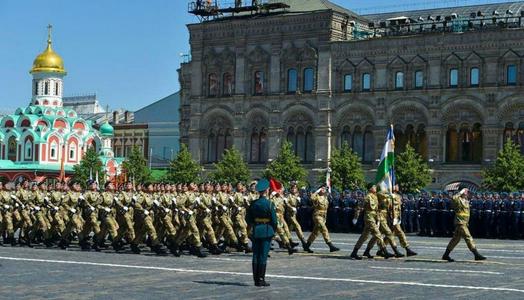 25 June25.06VideoAn Uzbek firstTashkent sends troops to Russia’s Victory Day Parade for the first time. There they took part alongside their neighbours
25 June25.06VideoAn Uzbek firstTashkent sends troops to Russia’s Victory Day Parade for the first time. There they took part alongside their neighbours -
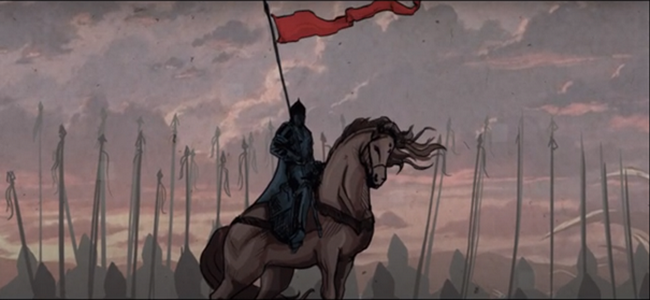 29 May29.05A Great CrusadeKyrgyz deputies mobilise against anti-corruption group Chong Kazat’s rhetoric
29 May29.05A Great CrusadeKyrgyz deputies mobilise against anti-corruption group Chong Kazat’s rhetoric
